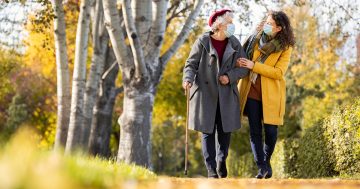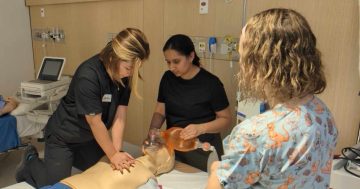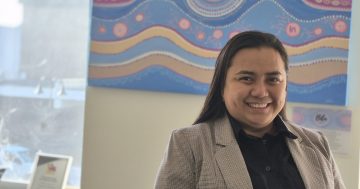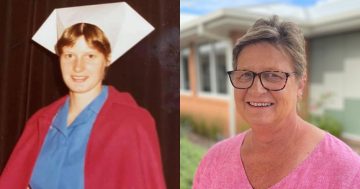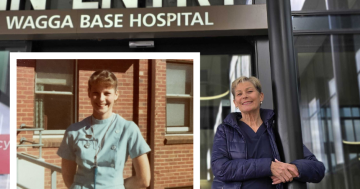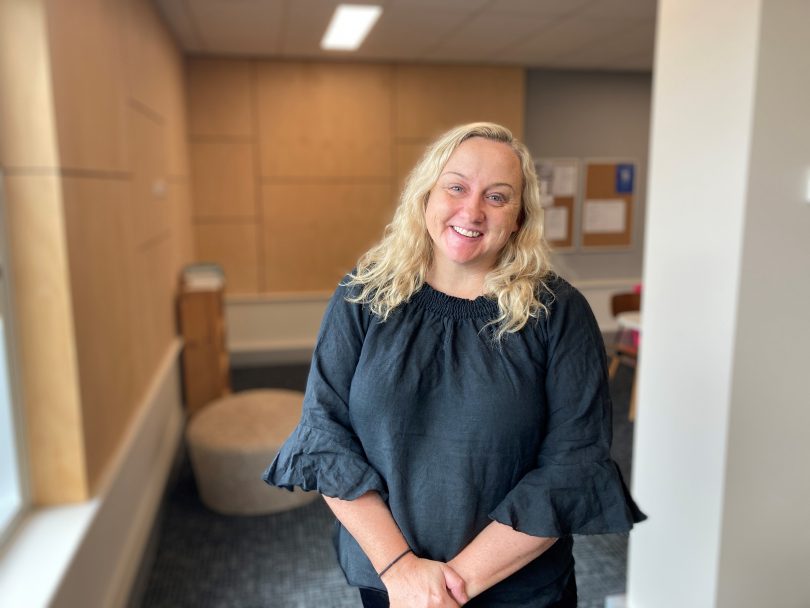
The onset of the COVID-19 pandemic was a “baptism of fire” for Murrumbidgee Local Health District clinical nurse consultant Mary-Clare Smith. Photo: MLHD.
Mask mandates weren’t necessarily welcomed by anyone, but for deaf or hearing-impaired people, they added an extra layer of isolation, according to Mary-Clare Smith.
As the Murrumbidgee Local Health District’s (MLHD) district infection prevention and control clinical nurse consultant (CNC), these considerations falls under her remit.
“We are currently working with a staff member who is deaf and, as you can imagine, we needed to offer other solutions for them in order to communicate clearly and at the same time manage the risk of COVID-19 transmission because that impacted her ability to lip read,” Mary-Clare said.
“People with hearing loss have really felt a heightened sense of isolation during mask-wearing mandates, so it was really important to me that we are working closely with her to implement changes that will not only assist her in her role, but also help people within the wider community who may also be affected.”
Mary-Clare has managed to keep calm and carry on during what she has described as a “baptism of fire”.
“I had been sitting in the role for a little over a year when the COVID-19 pandemic began, however, we used it as an opportunity for our team to actively demonstrate how important infection control measures are, turning what was a crisis-type response into something more normal,” she said.
“As health care professionals we have always been focused on and aware of infection control. We know the importance of hand hygiene and managing our infection control processes from admission to discharge in facilities, however, the topic is sometimes perceived as less exciting.
“The COVID-19 pandemic really gave us the opportunity to actively … demonstrate how crucial it is when people were looking to us for practical solutions to help manage the risks associated with the COVID pandemic response.”
Well-equipped to make sure that staff, facilities and patients were getting the support they needed to manage infection control, Mary-Clare and her team also found opportunities to help staff and patients who could be more affected than others – not just those with hearing loss, but also people with anxiety and other mental health conditions.
Mary-Clare has always been interested in helping others, and first completed her degree in Nursing following her HSC back in 1992. She very quickly found herself specialising in Psychiatric Nursing, then branching into child protection and then 10 years of management at an aged care residential facility.
“I have always been interested in helping the most vulnerable in the community, which can be challenging and heartbreaking, but also so rewarding. Working within those sectors was a good fit for me,” she said.
“As I gained more skills, experience and confidence and completed a short stint teaching at TAFE, I then found my passion was to help educate others and saw that there really was opportunity to create more impact by passing [on] my knowledge and skills as a clinical nurse educator.”
Now that Mary-Clare has a more district-wide role within MLHD, she is excited about the opportunities they have as a team to educate so many people on so many levels.
And luckily, the germs don’t bug her. “We like to think we are the goalkeeper of germs,” she said.
“Our group is fortunate to really implement relevant changes, because infection control is at the forefront of everyone’s minds right now. We have been able to actively capitalise and utilise the foundations in infection prevention and apply it across a variety of situations, including the MPS [Multi-Purpose Services] aged care facilities.
“Our approach is to normalise infectious control behaviours and have a more positive impact on mental health outcomes at the same time. People who feel confident that they are protecting themselves and others at work without having to stress out about it, are generally happier.
“There was a time not long ago that we all would drag ourselves to work even if we felt unwell due to the negative connotations around taking a sick day. We now better acknowledge and are more comfortable with the messaging around staying home when we are sick, because ultimately this is about taking care of ourselves and our co-workers. It is ok to stay home when we are sick, in fact it is expected!”
Original Article published by Kim Treasure on About Regional.







